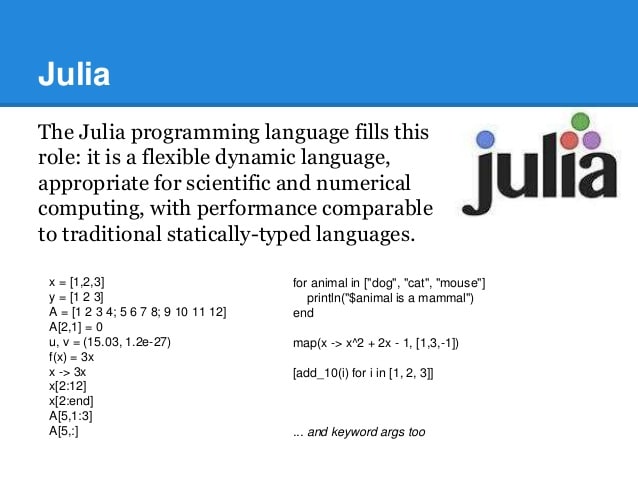Sometimes, you come across a name that pops up in quite a few different places, doesn't it? Like, you might hear it in conversations about making computer programs, or perhaps when people talk about popular movies, or even a delightful cooking show. It's almost as if the name "Julia" has a way of showing up in all sorts of interesting corners of our digital and creative lives. This piece aims to explore some of those varied appearances, giving you a friendly look at how this name connects to a range of exciting things, including how we share and experience information, sometimes through visual stories or learning materials, like a "video" might offer, you know?
We're going to take a little wander through the different areas where the name "Julia" makes an impact. From the clever ways folks build software to the stories we see on our screens, there's quite a bit to talk about. It's rather interesting to see how a single name can represent so many different ideas and endeavors. We'll chat about a programming tool that's helping folks do some pretty cool stuff with information, and then we'll shift our focus to some well-known figures who share that very name.
So, get ready to explore a bit. We'll touch on how a programming language helps create powerful applications, how a beloved actress has captured hearts for years, and even a television series that brings a famous chef's life to the small screen. It's all about how "Julia" shows up in our world, often through things we watch or interact with, which is, in a way, what we mean when we think about a "video" or visual content. We'll keep it simple and friendly, just like a chat with a good friend.
- Billie Eilish Bikini Video
- Pantalon Para Tiendas
- Are You Really Silly
- Paige Taylor Hot
- Us After Pound Town Meme
Table of Contents
- What is Julia, Anyway?
- Julia's Place in Modern Digital Creations
- Beyond Code - The Many Faces of Julia
- Learning with Julia - Tutorials and Visual Guides
- The Future of Julia - What's Next?
What is Julia, Anyway?
You might be wondering, what exactly is this "Julia" we're talking about in the context of computers and programs? Well, it's a pretty special computer language that helps people build all sorts of clever applications. It's designed to be fast and easy to use, which is quite nice, especially if you're working on something that needs to get things done quickly. In some respects, it's a tool that lets you create everything from small, focused services to big, complete software setups. It's rather versatile, you know?
Julia - The Language of Speed and Ideas
So, this programming language called Julia offers a whole bunch of helpful features. It can handle things in the background, meaning your computer doesn't get stuck waiting for one task to finish before starting another. It also lets you write code that can, in a way, understand and even change other bits of code, which is pretty clever. If you're building something, and you want to make sure it's working well, Julia has tools for finding and fixing problems, keeping track of what's going on, and seeing where your program spends most of its effort. It even has a simple way to add new pieces of software, which is quite convenient, honestly.
The folks who made Julia really wanted it to perform well. That means when you write a program using Julia, it gets turned into efficient code that your computer can run directly. This helps programs work quickly and smoothly across different types of computers. It's also a language that feels a bit like a scripting tool, meaning you can just type commands and see things happen right away, but it still has the power to handle serious tasks. It's rather dynamic, which is a good thing for flexibility.
- Color Illegal To Use On Cars
- Wo Xing Shi Lyrics
- Travis Kelce Uncle Rico
- Slick Back Middle Part
- Q Significa Jose
When it comes to doing sums or working with numbers in different ways, Julia comes with a complete set of basic tools. It handles all the usual arithmetic operations and ways to manipulate numbers at a very basic level. These tools are built to work well no matter what kind of computer you're using, and they do their job efficiently. So, whether you're adding, subtracting, or doing more complex number tricks, Julia has you covered, which is pretty neat, if you ask me.
In Julia, a "function" is like a little machine that takes in some information and gives you back a result. It's a way to organize your code so it does specific jobs. Now, these functions aren't like the perfect, unchanging rules you find in pure math, because they can sometimes affect other parts of your program or be changed by them. This gives them a bit more flexibility, allowing for more real-world applications. It’s a very practical way of doing things, actually.
Getting Started with Julia - Your First Steps
If you're thinking about trying out this Julia language, the main place to visit is julialang.org. That's where you'll find all the official information and, you know, the main hub for everything Julia. You can also peek behind the scenes at how Julia is built by looking at its source code, which is kept on a popular platform for code sharing. It's openly available for anyone to see and contribute to, which is pretty cool, if you ask me.
To begin your journey with Julia, you'll want to get it installed on your computer. Once it's set up, you can start learning how to use it. We're quite excited about the idea of Julia being your starting point for getting into the world of machine learning. This field, which involves teaching computers to learn from data, is truly growing fast and has tons of possibilities. It's a very vibrant area right now, honestly.
For anyone wanting to learn all about this programming tool, there's a definitive place to get all the information you need. Julia is a language that's not just quick and adaptable, but also pretty easy to pick up and use. And the best part? It's open source, meaning a community of people works on it together, and it's free for everyone to use. You can simply click a link to find out more and start your learning adventure. It’s quite accessible, in a way.
There's also a growing collection of short lessons about Julia, which is rather helpful. These lessons start with the very basics for beginners and then move on to more advanced subjects. So, whether you're just starting out or looking to tackle some tougher topics, there are resources to guide you. It's a good way to build your skills step by step, you know?
Julia's Place in Modern Digital Creations
So, we've talked a bit about Julia the programming language. Now, let's think about where it fits into all the digital things we see and use every day. It's not just for people who love numbers; it's a tool that helps build the very fabric of our connected world. It’s pretty central to some important areas, actually.
Building Big Things with Julia
As we mentioned, you can use Julia to put together whole applications. This means creating complete software programs that do specific jobs, perhaps for businesses or even for everyday users. And it's also good for making what we call "microservices." These are smaller, independent parts of a bigger system that work together, making it easier to manage and update complex software. It's a bit like building with very clever, interchangeable blocks, you know?
The way Julia compiles its programs means they run efficiently. This is because it uses a special system that turns your Julia code into something your computer understands very well, allowing it to work quickly. This also helps Julia programs run on many different types of computer systems, which is pretty useful for reaching a wide audience. It's quite adaptable, in some respects.
Julia and the World of Data
The official website for the Julia language is where you'll find everything about it. It’s the go-to spot for anyone interested. Julia is really making a name for itself in areas like understanding large amounts of information, teaching computers to learn, and creating models to predict things. These are fields that are very much about making sense of the world around us using numbers and patterns. It's a very relevant tool for today's information age, you know?
The definitive source for learning all about these areas, especially as they relate to Julia, is available. So, if you're interested in data science, making machines smart, or building mathematical representations of real-world situations, Julia is a language that helps you do all of that. It's quite a powerful tool for anyone working with information, honestly.
Beyond Code - The Many Faces of Julia
While the Julia programming language is certainly interesting, the name "Julia" itself has a much wider reach, extending far beyond lines of code. It's a name that brings to mind various well-known figures who have graced our screens and captured our attention. It’s pretty amazing how one name can represent so much, actually.
Julia Roberts - A Star's Journey
There's a famous actress named Julia Fiona Roberts. She never really thought she'd become one of the most beloved performers in America, but that's exactly what happened. She was born in a place called Smyrna, Georgia, and her parents were Betty Lou Bredemus and, well, her father. She’s become a household name, you know?
Personal Details and Bio Data
| Detail | Information |
|---|---|
| Full Name | Julia Fiona Roberts |
| Birthplace | Smyrna, Georgia |
| Mother's Name | Betty Lou Bredemus |



Detail Author:
- Name : Euna Moen
- Username : cormier.lew
- Email : mertz.jalen@gmail.com
- Birthdate : 1993-10-01
- Address : 1957 Elise Overpass Suite 850 Daughertyport, OR 63959-6726
- Phone : 574-366-3168
- Company : Barrows, Kassulke and Bradtke
- Job : Plant Scientist
- Bio : Molestias quis in velit non magni dolor ea. Porro corrupti porro quasi. Possimus voluptatem ad accusamus velit voluptatem perferendis. Voluptas accusantium iusto enim neque.
Socials
facebook:
- url : https://facebook.com/montana_id
- username : montana_id
- bio : Velit tenetur laborum voluptatem voluptas.
- followers : 4053
- following : 633
twitter:
- url : https://twitter.com/metzm
- username : metzm
- bio : Quaerat ex laudantium ad mollitia ad id. Autem nihil dolorem velit. Est eos id autem nihil illo ipsa voluptatum.
- followers : 6550
- following : 1978
instagram:
- url : https://instagram.com/mmetz
- username : mmetz
- bio : Quasi totam nemo totam nihil tenetur enim. Itaque veniam amet reprehenderit ut veritatis modi.
- followers : 3891
- following : 2908
linkedin:
- url : https://linkedin.com/in/metzm
- username : metzm
- bio : Voluptates quis assumenda voluptatum nisi.
- followers : 4233
- following : 501
tiktok:
- url : https://tiktok.com/@montana.metz
- username : montana.metz
- bio : Eligendi enim magnam eos dolores delectus consequatur quaerat.
- followers : 4797
- following : 498